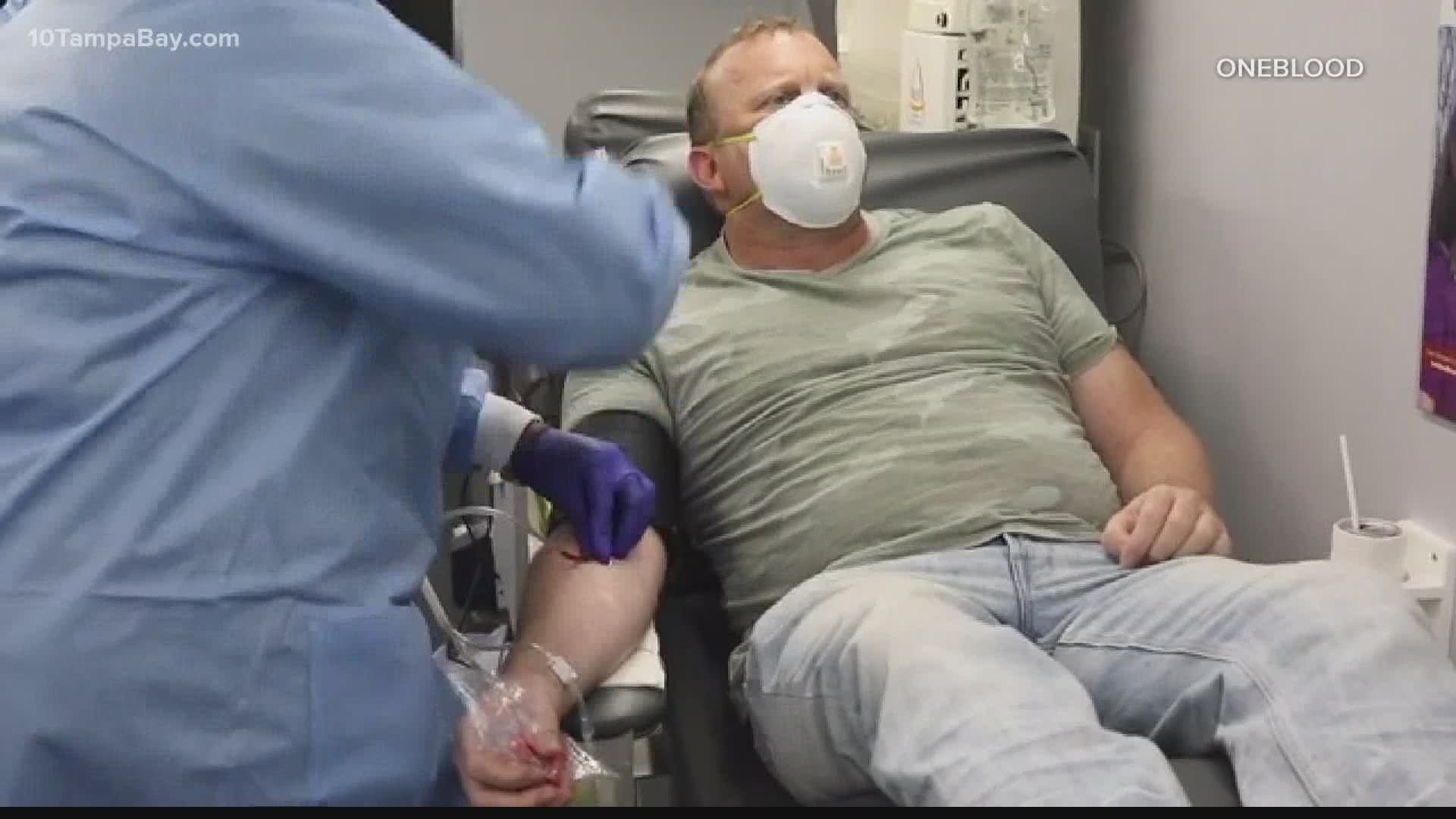ST. PETERSBURG, Fla. — A potentially life-saving treatment for hospitalized COVID-19 patients in Florida is in short supply as cases statewide continue to climb.
Demand for convalescent plasma has reached “extraordinary levels,” according to OneBlood, but supply cannot keep up as cases and subsequent hospitalizations for the virus increase. The statewide blood donation center reports seeing a more than a 500-percent increase in hospital orders for COVID-19 convalescent plasma.
Convalescent plasma comes from patients who have recovered from an infection—COVID-19 in this case—and is then transfused to patients currently sick with the same infection. Antibodies in the plasma—the liquid part of blood—can potentially boost a patient’s immune system and speed up recovery.
“We are urging people who have recovered from the coronavirus to step forward and donate their plasma, they are urgently needed,” Susan Forbes, with OneBlood, said in a press release.
The Red Cross is making similar calls for donations.
One hospital in Tallahassee had no plasma at all as recently as last week, according to a report from the Tallahassee Democrat, which forced doctors there to request some from a hospital hundreds of miles away in St. Petersburg.
RELATED: Supply for effective plasma treatment dwindles as Sarasota and Manatee see uptick in COVID-19 cases
The increased demand for the plasma is also due to more doctors opting to use it earlier on in the treatment process than before.
“We've seen a shift of utilizing convalescent plasma in patients that are outside of the intensive care unit,” said Dr. Eduardo Oliveira, medical director at AdventHealth in Orlando. “We are using convalescent plasma 50-percent more now than we were before.”
Similarly, at Sarasota Memorial Hospital, Dr. Kirk Voelker says the earlier a coronavirus patient begins convalescent plasma therapy the better.
“We’re trying to nip this thing in the bud, smolder the wildfire before it really ignites,” Voelker said.
Plasma is also quickly becoming doctors’ only option as supplies of remdesivir, a popular experimental drug given FDA emergency clearance to be used to treat COVID-19, are running out.
The state received a shipment of the drug from the federal government over the weekend, Gov. Ron DeSantis said Monday. The state is allocating the drug to hospitals as it’s requested.
“Most hospitals will be out of [remdesivir] this week, and the only thing we have is convalescent plasma as a standard of care treatment,” Voelker said.
“We’re running out of therapeutic options.”
But does it work?
This type of treatment is nothing new. For nearly a century, doctors have used convalescent plasma to help treat infectious diseases.
This type of therapy generally poses a low risk for other side effects, according to the Mayo Clinic, but researchers are still working to definitively determine just how effective it is at treating COVID-19.
Food and Drug Administration Commissioner Stephen Hahn recently said more than 28,000 Americans have received convalescent plasma treatment for COVID-19.
The Mayo Clinic is leading a massive study on the effectiveness of convalescent plasma therapy in COVID patients involving more than 2,600 hospitals, including Sarasota Memorial Hospital.
To date, 130 coronavirus patients have received convalescent plasma through SMH's clinical trial, according to Voelker, who said early anecdotal evidence is promising.
“You can see a person when they come in and they’re having these high-spiking fevers and almost uniformly they’ll get the convalescent plasma and within eight to 12 hours you’ll see their fevers come down, their vital signs stabilize and things look better,” he said.
“It’s a mainstay of our treatment.”
How to donate
A plasma donation from just one person can help treat up to four patients.
The overall process, according to OneBlood, is similar to a blood donation, but it can take longer.
Plasma can also be donated every 28 days.
RELATED: 'Help save lives': TGH starts convalescent plasma treatments on vulnerable COVID-19 patients
Dr. Voelker and others are urging people who have recovered from the coronavirus to check with their local blood banks to see if they meet the eligibility requirements to be a convalescent plasma donor.
“There are thousands of people out in the community who’ve had coronavirus who can literally save lives right now," he said.
Donors must not have COVID-19 symptoms for at least 14 days prior to donation and provide one of the following:
- Prior diagnosis of COVID-19 documented by a laboratory test or a letter from a hospital confirming a COVID-19 diagnosis.
- Or a positive serological test for SARS-CoV-2 antibodies.
In most cases, an appointment is required.
“We need the community to step up and help us out," Voelker said. "We’ll give it to them, we just need it in our blood banks.”
- New York will fine travelers from Florida $2,000 if they don't follow COVID-19 rules
- Gov. DeSantis gives coronavirus updates as man tries to shout him down
- Ex-official: President Trump suggested selling Puerto Rico after Hurricane Maria
- Is Pinellas County's COVID-19 positivity rate dropping?
- Sheriff's office 'confident' Naya Rivera found dead at 33 after suspected drowning
- 'It's not the same for everyone, and no one's safe': 25-year-old shares her battle with COVID-19
►Stay In the Know! Sign up now for the Brightside Blend Newsletter



